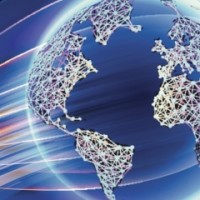 This week at the World Economic Forum in Davos we have raised attention to a new topic in the digital era: “The importance of unshackling our digital life
This week at the World Economic Forum in Davos we have raised attention to a new topic in the digital era: “The importance of unshackling our digital life
“Unshackling digital life” means openness, freedom and an easy portability of our digital life, increasing thus consumer possibilities, besides protecting and achieving public digital confidence, unleashing the full potential of the Digital Economy.
The world is changing. We are living a digital revolution that impacts the society as a whole in an irreversible way. We need access, sharing and porting our digital life in a simple and seamless way, while protecting our privacy and security.
Over the next 5 to 10 years the nature of the activity is poised to change considerably: another 2 billion people will be online, connected devices will exceed 50 billion and new business models will transform industries and society.
More aspects of our everyday life and interactions are becoming digital: not only work or industries, but also our social communications, entertainment, commerce & services, finance, cars, cities, education, relations with governments and healthcare.
Changes bring new challenges. Now, it is basic to simplify access to our digital life.
Digitalization is good for consumers, industry & governments. A strong digital economy is vital for competitiveness in a globalized economy. Digital services are an unprecedented catalyst for change, growth and jobs. But also, the social welfare linked to the success of the digital economy is a positive result, in particular when achieving a digital life for all.
Freedom of choice, interoperability and an easy portability of digital life drive digitalization and a seamless digital experience for consumers
Life is shifting to become a mobile digital life, with users becoming highly dependent on the devices, operating systems, mobile browsers and application stores.
Users may benefit if their digital assets could be more easily used and ported across different devices or platforms. Customers need to be able to access their data, transport them, and use them in any device, app, or operating system in a seamless way. That is in particular so for metadata (i.e. contacts, reports, mails, social interactions) and contents (i.e. ebooks, music, photos, videos, reports). Copyright regulation may need to be addressed.
Interoperability of services and applications, in particular among messaging services avoids lock-in effects.
Interoperability and enabling a simple portability of digital life:
- Brings a seamless and simpler digital experience for consumers, drawing them to digital life
- Becomes essential to decrease the digital divide (even though when action on improving digital skills remains a need).
- Helps competition, efficiency and grants users the freedom choice of any of the product or services in the value chain (i.e iMessage is not available outside Apple and Whatsapp is not available for Firefox and, as there is no interoperability, users can not choose to buy different devices with other messaging Apps to communicate to millions of users ).
- Enables the birth of new services
Openness helps digitalisation, better services and stronger and more interconnected societies
Customers want a simple, multichannel, multidevice mobile experience. Strategic technologies such as Cloud and Big Data, where sharing data and contents is essential, are important enablers for productivity and better services.
Being that said, customers own their private data, not any application or company. And that means not only digital identity, financial or health information, but also mails, contacts, social interactions, internet usage, location, purchases, etc. These data are linked to the user. Private data must be protected and rules need to be clear to increase digital confidence.
Anonymization tools providing a higher level of privacy protections for user sensitive data could bring useful features and services to consumers and businesses. Big Data aims to process, collect, store and analyse large amounts of data, enabling companies understand how others perceive their products and marketing and adapt to the consumers.
An example could be Smart Steps by Telefónica. Smart Steps is a product providing insights based on the behavior of crowds to help companies and public sector organizations make informed business decisions. It enables to analyze footfall in any specified location and see the catchment of any specified area.
Openness is crucial to ensure the development of new services & apps. Many app providers and content providers only offer services to iOS and Android devices, restricting freedom of customers. For example recently John Chen, the CEO of Blackberry has said online content provider Netflix, has “discriminated against BlackBerry customers”, by not making its movie streaming services available for BlackBerry devices.
Open data is an untapped resource with a huge potential for building stronger, more interconnected societies that better meet the needs of citizens and allow innovation and prosperity to flourish. In particular Open API, allowing access to anonymized data, could enable a boom of innovation driven by different agents in unexpected ways. For example, in Smart Cities the aggregated information made available to different agents enables all kind of applications to improve citizens’ lives.
I believe the re-use of public sector information shall be promoted actively and legislation should be designed to facilitate digital interaction between citizens and businesses and the public authorities. In particular efforts could be made to apply the principle that information is collected from citizens only once and shared among administrations, in due respect of data protection rules.
And when sharing /accessing private data among different agents, there is a need for trusted digital identity services, to protect consumers. Network operators can provide mobile identity services, securely authenticating access to banking services, health records or other applications.
So, let me conclude that Openness, freedom, a simple portability of digital assets, and digital confidence through privacy, security and transparency, should be the pillars of unshackling consumer digital life, to provide a new digital life experience for Society and unleash the full potential of the Digital Economy.








